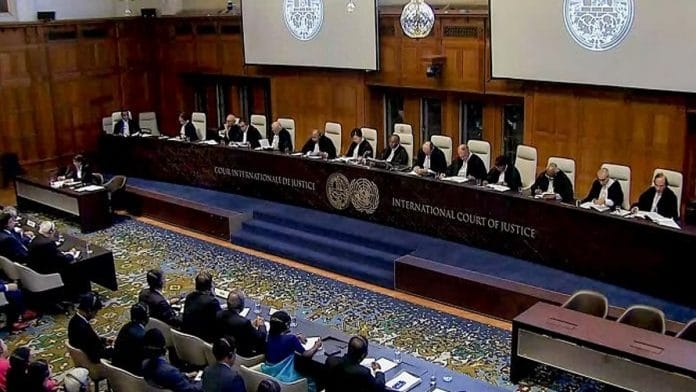New Delhi: The International Court of Justice (ICJ) has for the first time said that Israel’s continued occupation of Palestine violates international law.
While the international court’s opinion is not binding, it lays out its stance on the question of the legality of Israel’s continued occupation of the Palestinian territories of West Bank and the Gaza strip.
“The Court is of the view that Israel’s assertion of sovereignty and its annexation of certain parts of the territory constitute a violation of the prohibition of the acquisition of territory by force,” the ICJ said in a press release after the judgment was read out by its president Nawaf Salam.
The ICJ also ruled that Israel’s settlement policy in the West Bank and Gaza is unlawful and advised Tel Aviv to “cease immediately” all settlement activities and evacuate all settlers present in the occupied territories.
In its ruling, the ICJ also said that Tel Aviv has an obligation to make reparations for the damages caused to all “natural or legal persons” concerned in the Palestinian territory.
In response, Israeli Prime Minister Benjamin Netanyahu issued a statement on X: “The Jewish people are not occupiers in their own land, including in our eternal capital Jerusalem nor in Judea and Samaria, our historical homeland. No absurd opinion in the Hague can deny this historical truth or the legal right of Israelis to live in their own communities in our ancestral home.”
The Jewish people are not occupiers in their own land, including in our eternal capital Jerusalem nor in Judea and Samaria, our historical homeland. No absurd opinion in the Hague can deny this historical truth or the legal right of Israelis to live in their own communities in…
— Benjamin Netanyahu – בנימין נתניהו (@netanyahu) July 19, 2024
Israel has occupied the West Bank and Gaza since the end of the Six-Day War in 1967. The two territories are a part of what Palestinians consider their homeland, and over the years there have been negotiations between Palestine and Israel over the future of the territories. The most famous of negotiations culminated in the Oslo Accords in 1994.
The request for an advisory opinion by the ICJ was first made by the United Nations General Assembly in 2022, much before the outbreak of the current conflict between Israel and Hamas in Gaza.
Hearings for the case opened in February this year, with over 50 countries and multilateral organisations such as the African Union, the Organisation for Islamic Cooperation and the Arab League appearing before the Court.
While Israel did not appear before the Court, it did send in written submissions on the case, stating that any advisory opinion by the ICJ would be “harmful” for negotiations on the resolution of the conflict.
The vast majority of the countries that appeared before the ICJ argued in favour of declaring the occupation as illegal, while countries like the UK and Canada urged the Court to not pass an advisory opinion.
The US, Israel’s oldest and strongest ally, urged the Court to limit its opinion, keeping in mind the security needs of Tel Aviv.
(Edited by Gitanjali Das)
Also Read: 3 in 4 Israelis support retaliation against Hamas or believe it hasn’t gone far enough, finds Pew






